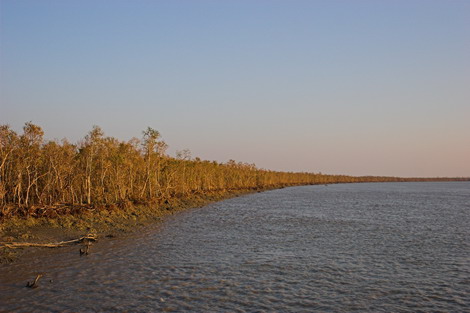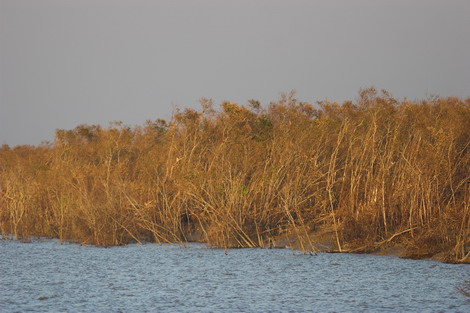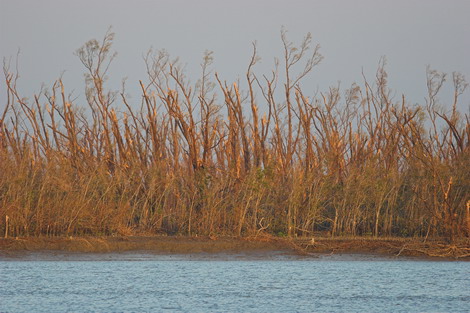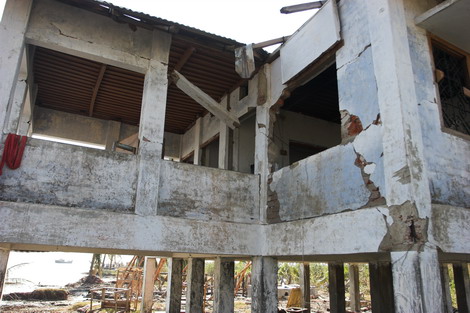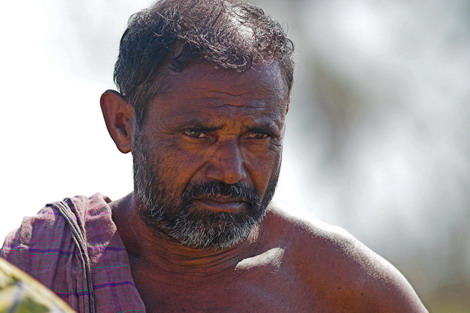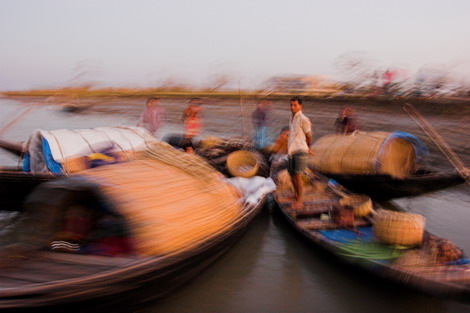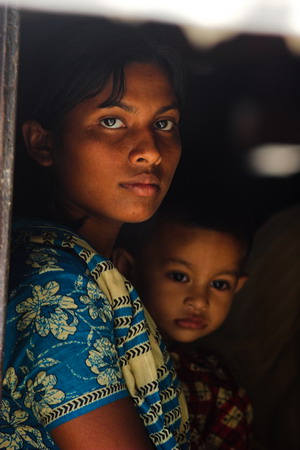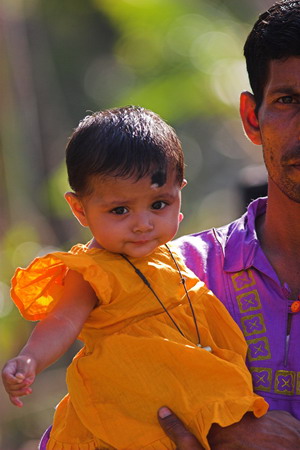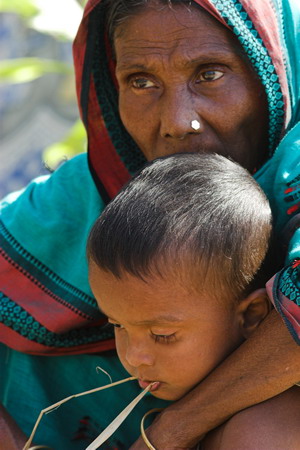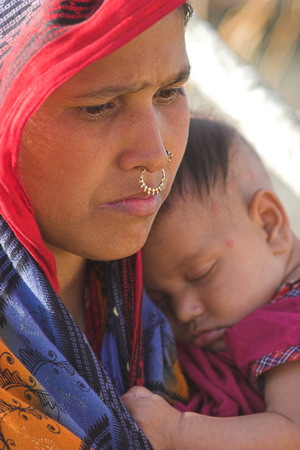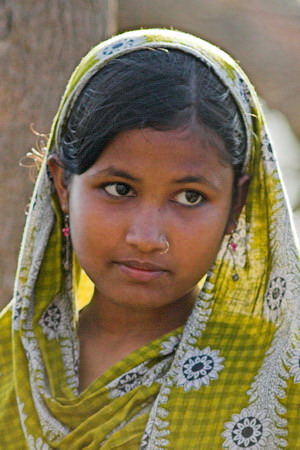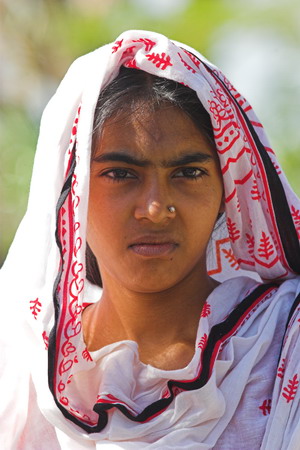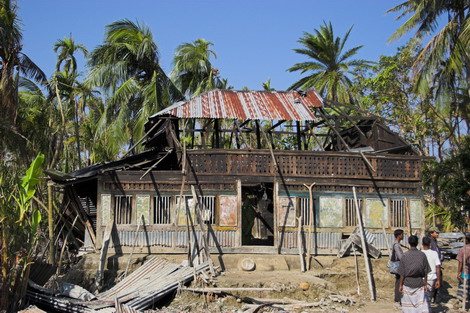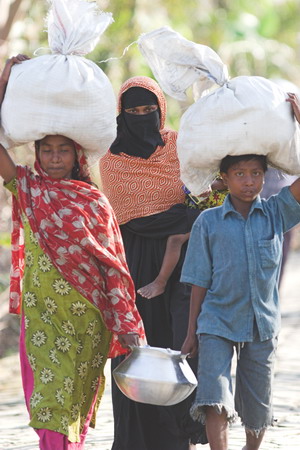All Photo Copyright Sirajul Hossain 2007
Carmen: The Serpent of the Evil River….
One of my favorite cartoon show is “Courage the Cowardly Dog” directed by John R Dilworth. Three characters live in a lonely house which stands in the middle of nowhere. In the background there is a curved horizon in every side announcing its single presence in the earth and nothing around except a squeaking windmill and a truck. Courage is the enthusiastic and innovative, hard working and soft hearted cowardly dog who is the key character and is scared of many things including his own shadow. Eustace, a skinny, lazy, greedy, heartless, impolite, ordering, bullying, shouting husband always likes to watch TV. Who always is ordering food to his wife, whatever the situation is and gets extreme pleasure scaring or Courage wearing a green mask and saying “Öoga Booga Booga”. When he is hungry, then nothing is more important in the whole universe and orders his wife for food. And the wife is Muriel, who is a chubby, kind hearted, loving, caring and very simple minded housewife. Who is a kind of victim of her husband’s tyranny many times. In their lonely house there always a visitor either from outer space or from the centre of the earth or from the bottom of the sea. They might be an evil monster or a good hearted with a lot of trouble. Either from the curse of the visitor or from the stupidity of Eustace Muriel is often in trouble. Courage, scared to death in the beginning wins his fear and courageously saves Muriel at the end either for his love for Muriel or to get a little cares and a cup of tea from her sitting in her lap. If you see carefully, you will find a Eustace, a dominating and abusive, a Muriel, passive and accepting and a Courage who is cowardly but the most courageous and innovative when motivated by love in almost every family.
The Evil River
In one episode, one day as usual Eustace was watching TV and Muriel was ironing cloths, courage was helping playfully folding the cloths. A captain of a boat announces on the TV about an adventure trip which is free for the first three passengers. Eustace, always interested in free things declares to take the trip. They started the journey and in the beginning they started enjoying it, but soon they finds out that the captain has other plans. He forces them to work for him in the boat and it comes out in time that he has bigger agenda. His destination is the “Evil River” where he wishes to catch the angry fiery serpent “Carmen”. He sends Courage on top of the mast to notify when the river has a bend. Poked severely by a naughty bird Courage finally rings the bell when he sees the bend of the river, but it was a bend downwards, a fall. After the long fall, suddenly the river changes, the greenish water becomes red, the green jungle becomes ruddy brown. The captain declares his hidden agenda, catching the Carmen, the serpent of the evil river. But Courage fails to catch Carmen with his bait as the captain insisted. The captain changes his strategy, he searches for a lure, big and round and chewy, he uses Muriel as a lure putting her in a cage. The Carmen attacks and takes away Muriel. Courage bravely jumps in the evil river wearing his green scuba suit and follows Muriel. Muriel finds out that Carmen has a nice voice but there is no audience to enjoy her opera. Muriel and Courage enjoyed her opera and Carmen becomes happy. Carmen joins with them happily to the rest of their trip. When all these happened, Eustace did not come down to save Muriel, because it was too cold outside. Unfortunately when he was alone in the boat, some monkey hijacked him and started having naughty fun with him.
Near Kokilmoni
It was a sunny afternoon and our boat was cruising at about ten knots. When we passed Tambulbunia, I came on the deck and looking at the riverbank with my confused sense of reality. It was just become real that we are cruising through the ‘evil river’. It was an absolute surreal experience. My visual reality was completely contradicting with my last twelve years vivid memory of this pristine forest. It was all reddish brown, kilometers after kilometers. The first and momentary feeling before realization was funny, wao… funky color. But when consciousness takes over, you see they are all dead. A deep sadness takes over, which doesn’t go.
Katka
Imagine with a wind of 240km/h, when all the leaf blown away, miles after miles, where did the insects go? The birds? When all the branches taken away, where did the monkeys go. When the tide went up 10 to 20 ft, where did the deer go? People said, they saw the next morning, thousands of fish lying dead on the banks of the creeks, in the jungle. Suddenly you feel that you are traveling hours after hours trough the remains of a natural ‘genocide’.
They say Sundari is strong. So strong that the saw mills do not like to saw it. But the storm had no mercy. Kewra, the weakest, lost most of its branches and all of its leaves in the effected area. All other tree suffered including Golpata. We did not see any Golpata intact. Many trees were twisted and broken and 90% of the leaves died in the effected area. That made the whole view reddish Brown.
Nothing was safe
I didn’t take my usual photo gears because till the last moment we were not sure which boat we are going to get. We planned for the worst, to hire a trawler from Khulna or Mongla which is always risky for dacoits and would be a hard way to manage because we had quite a lot of goods with us. We started from Khulna with quite a lot of relief material at night and arrived at Mongla in the morning by Chutti which is safe and comfortable. Thanks to Guide Tours and NI Bachchu.
Damaged Canopy in Many Places
We purchased 10 ton of drinking water and that took some time to load. Our primary destination was Dubla Island as we got news that many people are still there and there might be shortage of food. The route was planned in a way that we touch most of the forest station, see their situation and get some information about the effects of the cyclone.
Katka Rest House
We first arrived at Harintana, then to Kokilmoni, Tear Char, and all was looking similar. Trees broken, leaf blown away and all wooden forest offices fall down. No jetty anywhere and the buildings had no roof, windows broken and some walls also fall off. Boats are mostly taken away and some can be seen on the forest floor.
Dubla Forest Office
Some people are coming out from the forest offices and telling us there horror story. Many said they are living on only Chira (Flattened Rice) and molasses. We provided them cloth, rice and other food materials including drinking water and medicine. We also provided some to the fishermen there.
Survived Fisherman 1
We then cruised to Dublar Char. There we visited the cyclone shelter, provided food and material and listened their terrible story. About 700 people were in the cyclone centre and the building was rolling back and forth with the angry sea waves. It was low tide, the water started coming at 21:00 there and wind then was pretty strong. Within 30 minutes the water rose up to the ceiling of the 2nd floor at around 21:30. People inside the room became so scared of drowning inside the room that they started to break the door and window with the axe.
Survived Fisherman 2
Many went out and the wind was so strong that they all lost their cloths instantly and became necked by more then 200km/h of wind. Who climbed up to the roof, some survived and many are missing. Many told if it would stay ten more minutes, they all would die. The same said Katka people, there water was also reached to the ceiling, many survived by hanging from the roof frame sinking their body in the neck deep water. Water went away very quickly, within 15-20 minuets. We didn’t deliver much there because all owners of the fishermen were having supply by navy and they were cooking together for a group of about 300 people.
Dubla Island
In many fishing villages like Dubla, Shalar Char, Char Meher Ali etc. fishermen work under the owner. There were 19 owners and more then fifteen thousand fishermen working that time. We found three technicians and radio operators from Red Cross there. One of them was present there during the cyclone on duty. Many other Red Cross volunteers (more then hundred) were engaged there to warn and convince people to come to the shelter. Some came but many didn’t. One Hindu owner said to the Red Cross men “Koto Dosh Nombor Dekhlam, Kichu Hobe Na” (Saw many number ten warning, I will be ok). He didn’t leave his hut and he died, they found his body.
Survived Fisherman 3
Fishing labors usually get portion of the catch in exchange of their daily work. They make their own dry-fish out of it. It is their whole season’s saving, they usually do not like to come to the shelter risking their goods. It might be stolen or destroyed. Instead a couple of them gather their goods on a boat and hide the boat in a creek. In this way they survive and their goods remain safe. But this time the water level was so high that all became part of the dangerous sea. The wind was so strong that they all scrambled away. Among those approximate 15,000 men, at least half were not there after the storm. And nobody knows how many found their home and how many went to their final destiny. Legally it will take twelve years to declare them dead who will never come back.
White Bellied Over The Brown Forest
I do not think there were much problem with warning system (although many so called experts sitting in Dhaka inventing enormous faults in the warning system). All warning were even personally reached to all by broadcast radio, by special HF radio (Red Cross) and by at least couple of thousand Red Cross volunteers. One indication of it that there were not known significant reports of missing or capsize of sea going boats in the sea. All returned in time before the landfall. The problem was inadequate cyclone shelter and unwillingness of coming there leaving their belongings. People couldn’t think that it will be so strong in their own premises.
Cyclone Centre at Katka Collapsed 3 Months Ago
In Katka and Kachikhali, all wooden houses were destroyed, buildings lost their wall, window, corogated sheet roof except the rest house at Kachikhali which had a RCC roof. The tower at Katka is still there but no jetty anywhere. There is more devastation in Katka then Kachikhali although Kachikhali is closer towards Balleshwar River which is the centre of the landfall. This is because the eye of the cyclone has lower power and lower wind speed.
A Bat in Kochikhali
I have no realistic idea about wildlife loss although there is lot of habitat destruction in the eastern Sunderban. We cruised from Mongla to Harintana, Tear Char, Kokilmoni, Shalar Char, Katka, Kachikhali, Shupoti, Shoronkhola. We surely saw very little wildlife compared to what we usually see cruising in those areas. We saw one crocodile, four kingfishers, one egret, two White wellied sea eagle, a couple of Brambhini kite, four Monkeys, one Adjutant, one Open bill stork (in Dubla, first time for me), some Bat and only four Deer and some Gulls.
Fishermen at Tear Char
Many people at Dhaka are blaming climate change for Sidr including in the BBC talks, some to the signaling system and some to everybody. Some are suggesting cleaning up Sunderban and making sky high dams all around. There is no shortage of ideas. In one seminar I was invited, one ex-engineer of Grameen Bank submitted a plan where the whole village built inside an artificial hill. I asked him about the cost and how in his idea the money will come from. All project lovers really working hard to make something in this chance. Many people already completed their verdict and already asked the compensation from IPCC and hoping if the Kyoto protocol works, all cyclones will stop soon.
From my point of view, most who are working or living in the coast are the poorest people in the universe. They have no sense of yesterday or tomorrow. When we are young, careless and desperate, until we see the police around, we do not care about speed limit signs while driving. Although we know very well that it is deadly. But we do care when we have a family and responsibility or a dream for future. Weather warning is like speed limit to these people. Until their economic condition improves, until they carry a happy family, with a dream and responsibility, we will not be able to bring them all in the shelter.
Katka One of the Forest Building
The immediate task is to make enough cyclone shelters in the coastal areas. Most of them are built around 1994 and most are broken. There must be a high priority project of making a couple of thousand well designed cyclone centers as soon as possible. All forest offices also should have one.
Housewife in Shoronkhola
There is a trend and specially from the learned people and from the agencies of some developed countries to change things, to build things, a desire to control the situation by manipulating the whole system. It might have a short term advantage in some cases but mostly it welcomes other disasters to nature and to socio or eco systems. From thousands of years people in these lands are living in harmony with nature by respecting nature and its power. We need development to save life but it should be well thought and should be applied with great care to have minimum conflict with the existing natural and social system.
I started with the story of Carmen, an old Spanish story. Carmen was a very attractive, irresistible gypsy girl who attracts man and promises happiness. But he who goes too close to her, her manipulative character and fiery temper destroys him soon. The tropical sea is like Carmen, beautiful, rewarding most of the time but fatal if someone do not respect the line of safety. We cannot catch the Carmens, cannot eleminate them. they born again and again in every society, in every generation, we have to learn to live with them.
The Next Party Will Leave On 17th Dec. 2007
We are going again on 17th of December with baby food, baby winter cloths, books and school materials etc. We also have some funds for food and habitat development. If any of you wish to contribute please contact me.
Some babies I have seen…….
visit my site: http://www.sirajul.com


